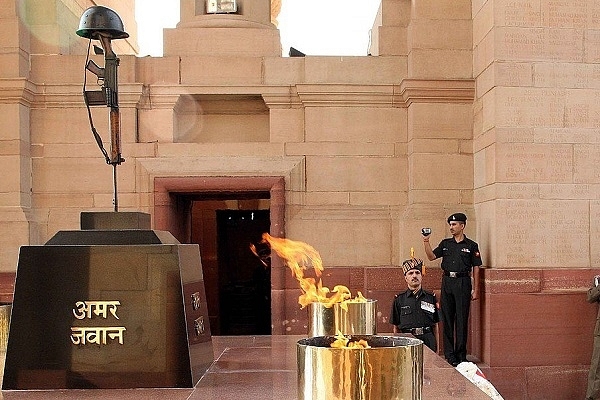News Brief
"A Temporary War Memorial": What Indira Gandhi's Defence Minister Jagjivan Ram Said About The Amar Jawan Jyoti In 1972
- "A proposal to construct a permanent war memorial (Amar Jawan) at Delhi to commemorate all our war dead since Independence is under active consideration of the government", Babu Jagjivan Ram had told Parliament.

Amar Jawan Jyoti at India Gate - Representative Image (Ministry of Defence/Wikimedia Commons)
The merger of the eternal flame at the Amar Jawan Jyoti complex under the India Gate with the 'Flame of the immortal soldier' at Amar Chakra of the National War Memorial has caused a political furore. The Congress, which sees the Amar Jawan Jyoti as a legacy of former prime minister Indira Gandhi, has opposed the Narendra Modi government's move.
Former Congress President Rahul Gandhi, who is leading the charge, has said that the Amar Jawan Jyoti will be lit again, without explaining what he means. The comment has been interpreted to mean that a future Congress-led government will restore the memorial.
“It is a matter of great sadness that the immortal flame for our brave soldiers will be extinguished today. Some people cannot understand patriotism and sacrifice - never mind...We will once again light the ‘Amar Jawan Jyoti’ for our soldiers,” Gandhi said in a tweet.
The Central government has argued that the Amar Jawan Jyoti complex was a temporary memorial to honour the sacrifice of the soldiers who fought in the 1971 war with Pakistan and that the merger of the flame with the one at the National War Memorial is a logical move. The Congress, however, has accused the government of lying and "erasing history".
However, it now appears that it is the Congress that has been trying to muddle history, if not erase it. The memorial set up under the arch of the India Gate by the Indira Gandhi government in 1971 and inaugurated ahead of the Republic Day in 1972 was temporary, the then Defence Minister, Jagjivan Ram, said in Lok Sabha on September 1972. He had also revealed that the government was discussing the proposal to set up a permanent war memorial to honour the soldiers who have fought in the wars since the country's independence from the British in 1947.
“A temporary War Memorial with an Amar Jawan Jyoti has already been constructed under the arch of the India Gate in Delhi. A proposal to construct a permanent war memorial (Amar Jawan) at Delhi to commemorate all our war dead since Independence is under active consideration of the government. Whether the names of the war dead, including those of the December 1971 war with Pakistan, will be inscribed individually or whether their memory will be collectively commemorated by inscribing the names of Regiments and units, which took part in the various military operations and conflicts since Independence, is a matter on which the decision will be taken at an appropriate time,” Indira Gandhi's Defence Minister said in a written reply to a question asked by Congress’ Junagadh MP Vekaria Nanjibhai Ravjibhai.
“Whether the government proposes to erect a victory memorial where names of the personnel of Armed Forces who died in the December 1971 war with Pakistan will be inscribed; if so the location thereof; if not reasons there for," the Congress MP had asked in Lok Sabha.
Jagjivan Ram served as India's Defence Minister for nearly seven of the eleven years between 1970 and 1980. He served his first term as Defence Minister between 1970 and 1974 under Indira Gandhi. After resigning from the Congress-led government in February 1977, he served the second term as Defence Minister between 1977 and 1979 under Morarji Desai. He briefly served as Deputy Prime Minister between January 1979 and July 1979.
While the government has used this piece of history to buttress its claim on the Amar Jawan Jyoti, the Congress is yet to acknowledge it.
Support Swarajya's 50 Ground Reports Project & Sponsor A Story
Every general election Swarajya does a 50 ground reports project.
Aimed only at serious readers and those who appreciate the nuances of political undercurrents, the project provides a sense of India's electoral landscape. As you know, these reports are produced after considerable investment of travel, time and effort on the ground.
This time too we've kicked off the project in style and have covered over 30 constituencies already. If you're someone who appreciates such work and have enjoyed our coverage please consider sponsoring a ground report for just Rs 2999 to Rs 19,999 - it goes a long way in helping us produce more quality reportage.
You can also back this project by becoming a subscriber for as little as Rs 999 - so do click on this links and choose a plan that suits you and back us.
Click below to contribute.
Latest